Following WWII a rift emerged between the capitalist nations
Following WWII, a rift emerged between the capitalist nations of the West and the communist nations of the East after World War II. In an attempt to orchestrate the economic and internal affairs of Eastern European communist nations, the Soviet Union instituted the Brezhnev Doctrine. Another major communist power to emerge during this period was China. Under the leadership of Mao Zedong, the Chinese communists took control of the country in 1949 after a long civil war. While both China and the USSR rose to be major communist powers, they did not always agree on policies, as demonstrated in the Anti-Soviet Policy of Communist China.
In your initial response, discuss how the source demonstrates the different relationships that the Chinese and the USSR had with Western nations. What complaints did the Soviet Communist Party have with the Communist Party of China? What specific policies did they view as anti-Soviet and why? What historical events demonstrate these various relationships?
Solution
In mid-1963, officials from the Soviet Union and the People’s Republic of China met in Moscow to try to mend their ideological rift. The Chinese government had become openly critical of what it referred to as the growing “counterrevolutionary trends” in the Soviet Union. In particular, China was unhappy with the Soviet Union’s policy of cooperation with the West. According to a public statement made by the Chinese government on June 14, 1963, a much more militant and aggressive policy was needed in order to spread the communist revolution worldwide. There could be no “peaceful coexistence” with the forces of capitalism, and the statement chided the Russians for trying to reach a diplomatic understanding with the West, and in particular, the United States.
Exactly one month later, as the meetings in Moscow continued to deteriorate in an atmosphere of mutual suspicion and recrimination, the Soviet government issued a stinging rebuttal to the earlier Chinese statement. The Russians agreed that world communism was still the ultimate goal, but that new policies were needed. “Peaceful coexistence” between communist and capitalist nations was essential in the atomic age, and the Soviet statement went on to declare that, “We sincerely want disarmament.” The Soviet statement also addressed the Chinese criticism of the October 1962 missile crisis, in which Russia aided in the establishment of nuclear missile bases in Cuba. Under pressure from the United States, the bases had been withdrawn–according to the Chinese, Russia had “capitulated” to America. Not so, according to the Soviets. The missile bases had been established to deter a possible U.S. invasion of Cuba. Once America vowed to refrain from such action, the bases were withdrawn in order to avoid an unnecessary nuclear war. This was the type of “sober calculation,” the Soviet Union indicated, that was needed in the modern world.
Why China forged close relations with the USSR, 1949-57
a. Soviet Communism
The USSR was the world’s first communist state, and Mao always recognised its unique place in history, and in communism; in the early years of the PRC, the USSR was China’s model for development
b. China needed Soviet economic aid
Mao had no experience of industrialisation, and no resources for it, so in 1949, he signed the Treaty of Friendship; the Soviets sent experts, aid and loans – though Mao was later to feel that he had been exploited
c. Fear of the USA
Especially in the early years of the PRC, Mao feared a US invasion to re-establish Chiang Kai-shek, and he needed the support of the USSR as a deterrent
d. Support in the United Nations
In the UN, the USA recognised Taiwan as the legitimate government of China – only the USSR supported the cause of the PRC
e. Korea, 1950
In the Korean War, China and the USSR both supported North Korea, though the cost to China was much greater, and Mao was later to feel that he had been exploited
Treaty of Friendship, Dec 1949
a. $300m loans and aid
Though 95% of the Soviet money was in the form of loans, at a high rate of interest, plus the PRC was forced to send a substantial portion of its bullion reserves to the USSR
b. 20,000 experts
Though the USSR did not supply its 20,000 economic experts free; the PRC had to pay for them. Also Soviet ‘experts’ did not give independent advice, they imposed Soviet ideology … some of their advice (e.g. Lysenkoism) was rubbish
c. 80,000 students
The Soviets agreed to receive and train Chinese students to study science and technology in Russia
d. Dalian and Lushun ports
China ceded to the USSR use of two ports – Dalian and Lushun – in Manchuria
e. Xinjiang mineral rights
China ceded mineral rights in Xinjiang to the USSR
Korean War, 1950-53
a. Kim Il Sung, Jun 1950
In 1949, Kim Il Sung asked permission of Stalin and Mao to attack South Korea, which he did in June 1950; the UN sent troops to defend South Korea
b. People’s Volunteers, Nov 1950
By November 1950, the UN/US army under MacArthur had almost reached the Chinese border; after two warnings, 200,000 Chinese troops (\'People\'s Volunteers\') attacked – they had modern weapons supplied by Russia
c. Human Wave tactics, Dec 1950
In December 1950, 500,000 more Chinese troops entered the war, drove the Americans back (using costly \'human wave tactics\'); they advanced into South Korea, but the Americans fought back to the 38th parallel
d. Chinese losses and resentment
The Chinese admitted to losing 390,000 men dead, modern sources put the figure at nearly a million casualties; Mao resented that the Soviets did not commit men and made the Chinese pay for all the weapons they supplied
e. Panmunjong Truce, 1953
Only Stalin\'s influence was keeping China in the war; within a month of his death in 1953, the Chinese had signed a truce to end the fighting
Why did China break with the USSR?
a. Mao’s Moscow visit, 1949
Stalin treated Mao badly on his first visit to Moscow, housing him in a poor villa with no facilities
b. Treaty of Friendship, 1950
Mao came to resent the high cost the Treaty of Friendship and came to believe that China had been exploited by the USSR
c. Korean War, 1950-53
Mao came to resent the high cost of the war to China and came to believe that China had been exploited by the USSR
d. Ideological differences, 1957
At the Moscow Conference in 1957, Mao disagreed forcefully with Khrushchev’s policy of peaceful coexistence; Khrushchev called the Great Leap Forward ‘harebrained’
e. Khrushchev’s Beijing visit, 1958
When Khrushchev went to Beijing to try to repair relations, Mao put him in a poor hotel without air-conditioning, and humiliated him by insisting on holding the talks in a swimming pool (Khrushchev could not swim)
China’s relations with the USSR, 1959-69
a. Taiwan, 1958
Mao prepared an invasion of Taiwan, but had to back down when the USSR refused to offer even moral support
b. Albania, 1961
When the Albanian government refused to obey Moscow, the USSR withdrew its financial support; Mao stepped in and gave the Albanians money and technical aid
c. Moscow Conference, 1961
The Chinese walked out of the Conference over Albania; Khrushchev called Mao an ‘Asian Hitler’, Mao called him ‘a useless old boot’
d. Sino-Indian War, 1962
When a border war broke out between India and China, the USSR gave fighter-planes to the Indians
e. Sino-Soviet Confrontation, 1969
In 1969 there was a series of Sino-Soviet border clashes; China and the USSR reoriented their nuclear missiles away from the USA and at each other
| Why China forged close relations with the USSR, 1949-57 |
| a. Soviet Communism |
| The USSR was the world’s first communist state, and Mao always recognised its unique place in history, and in communism; in the early years of the PRC, the USSR was China’s model for development |
| b. China needed Soviet economic aid |
| Mao had no experience of industrialisation, and no resources for it, so in 1949, he signed the Treaty of Friendship; the Soviets sent experts, aid and loans – though Mao was later to feel that he had been exploited |
| c. Fear of the USA |
| Especially in the early years of the PRC, Mao feared a US invasion to re-establish Chiang Kai-shek, and he needed the support of the USSR as a deterrent |
| d. Support in the United Nations |
| In the UN, the USA recognised Taiwan as the legitimate government of China – only the USSR supported the cause of the PRC |
| e. Korea, 1950 |
| In the Korean War, China and the USSR both supported North Korea, though the cost to China was much greater, and Mao was later to feel that he had been exploited |
|
|
| Treaty of Friendship, Dec 1949 |
| a. $300m loans and aid |
| Though 95% of the Soviet money was in the form of loans, at a high rate of interest, plus the PRC was forced to send a substantial portion of its bullion reserves to the USSR |
| b. 20,000 experts |
| Though the USSR did not supply its 20,000 economic experts free; the PRC had to pay for them. Also Soviet ‘experts’ did not give independent advice, they imposed Soviet ideology … some of their advice (e.g. Lysenkoism) was rubbish |
| c. 80,000 students |
| The Soviets agreed to receive and train Chinese students to study science and technology in Russia |
| d. Dalian and Lushun ports |
| China ceded to the USSR use of two ports – Dalian and Lushun – in Manchuria |
| e. Xinjiang mineral rights |
| China ceded mineral rights in Xinjiang to the USSR |
|
|
| Korean War, 1950-53 |
| a. Kim Il Sung, Jun 1950 |
| In 1949, Kim Il Sung asked permission of Stalin and Mao to attack South Korea, which he did in June 1950; the UN sent troops to defend South Korea |
| b. People’s Volunteers, Nov 1950 |
| By November 1950, the UN/US army under MacArthur had almost reached the Chinese border; after two warnings, 200,000 Chinese troops (\'People\'s Volunteers\') attacked – they had modern weapons supplied by Russia |
| c. Human Wave tactics, Dec 1950 |
| In December 1950, 500,000 more Chinese troops entered the war, drove the Americans back (using costly \'human wave tactics\'); they advanced into South Korea, but the Americans fought back to the 38th parallel |
| d. Chinese losses and resentment |
| The Chinese admitted to losing 390,000 men dead, modern sources put the figure at nearly a million casualties; Mao resented that the Soviets did not commit men and made the Chinese pay for all the weapons they supplied |
| e. Panmunjong Truce, 1953 |
| Only Stalin\'s influence was keeping China in the war; within a month of his death in 1953, the Chinese had signed a truce to end the fighting |
|
|
| Why did China break with the USSR? |
| a. Mao’s Moscow visit, 1949 |
| Stalin treated Mao badly on his first visit to Moscow, housing him in a poor villa with no facilities |
| b. Treaty of Friendship, 1950 |
| Mao came to resent the high cost the Treaty of Friendship and came to believe that China had been exploited by the USSR |
| c. Korean War, 1950-53 |
| Mao came to resent the high cost of the war to China and came to believe that China had been exploited by the USSR |
| d. Ideological differences, 1957 |
| At the Moscow Conference in 1957, Mao disagreed forcefully with Khrushchev’s policy of peaceful coexistence; Khrushchev called the Great Leap Forward ‘harebrained’ |
| e. Khrushchev’s Beijing visit, 1958 |
| When Khrushchev went to Beijing to try to repair relations, Mao put him in a poor hotel without air-conditioning, and humiliated him by insisting on holding the talks in a swimming pool (Khrushchev could not swim) |
|
|
| China’s relations with the USSR, 1959-69 |
| a. Taiwan, 1958 |
| Mao prepared an invasion of Taiwan, but had to back down when the USSR refused to offer even moral support |
| b. Albania, 1961 |
| When the Albanian government refused to obey Moscow, the USSR withdrew its financial support; Mao stepped in and gave the Albanians money and technical aid |
| c. Moscow Conference, 1961 |
| The Chinese walked out of the Conference over Albania; Khrushchev called Mao an ‘Asian Hitler’, Mao called him ‘a useless old boot’ |
| d. Sino-Indian War, 1962 |
| When a border war broke out between India and China, the USSR gave fighter-planes to the Indians |
| e. Sino-Soviet Confrontation, 1969 |
| In 1969 there was a series of Sino-Soviet border clashes; China and the USSR reoriented their nuclear missiles away from the USA and at each other |
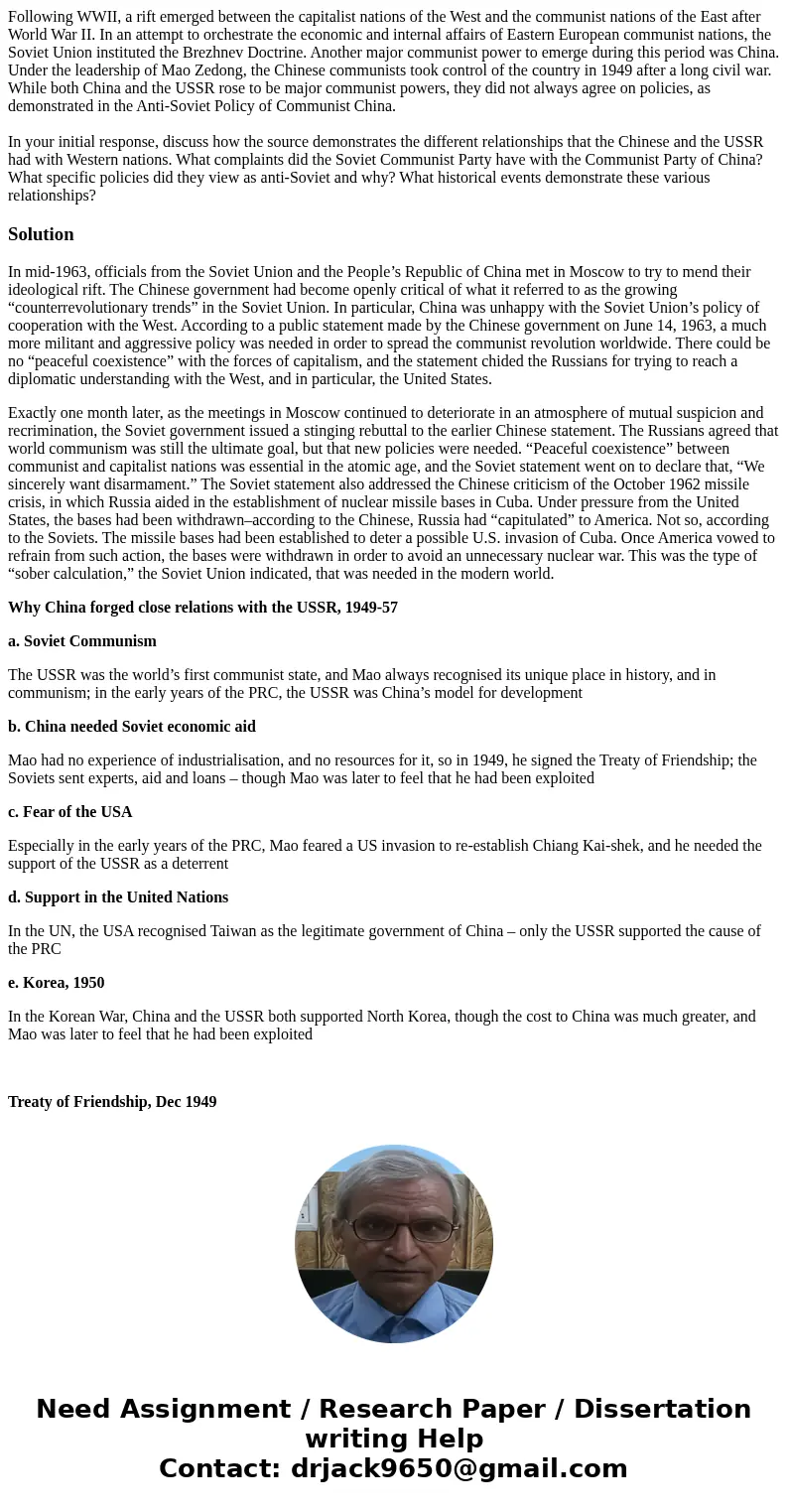
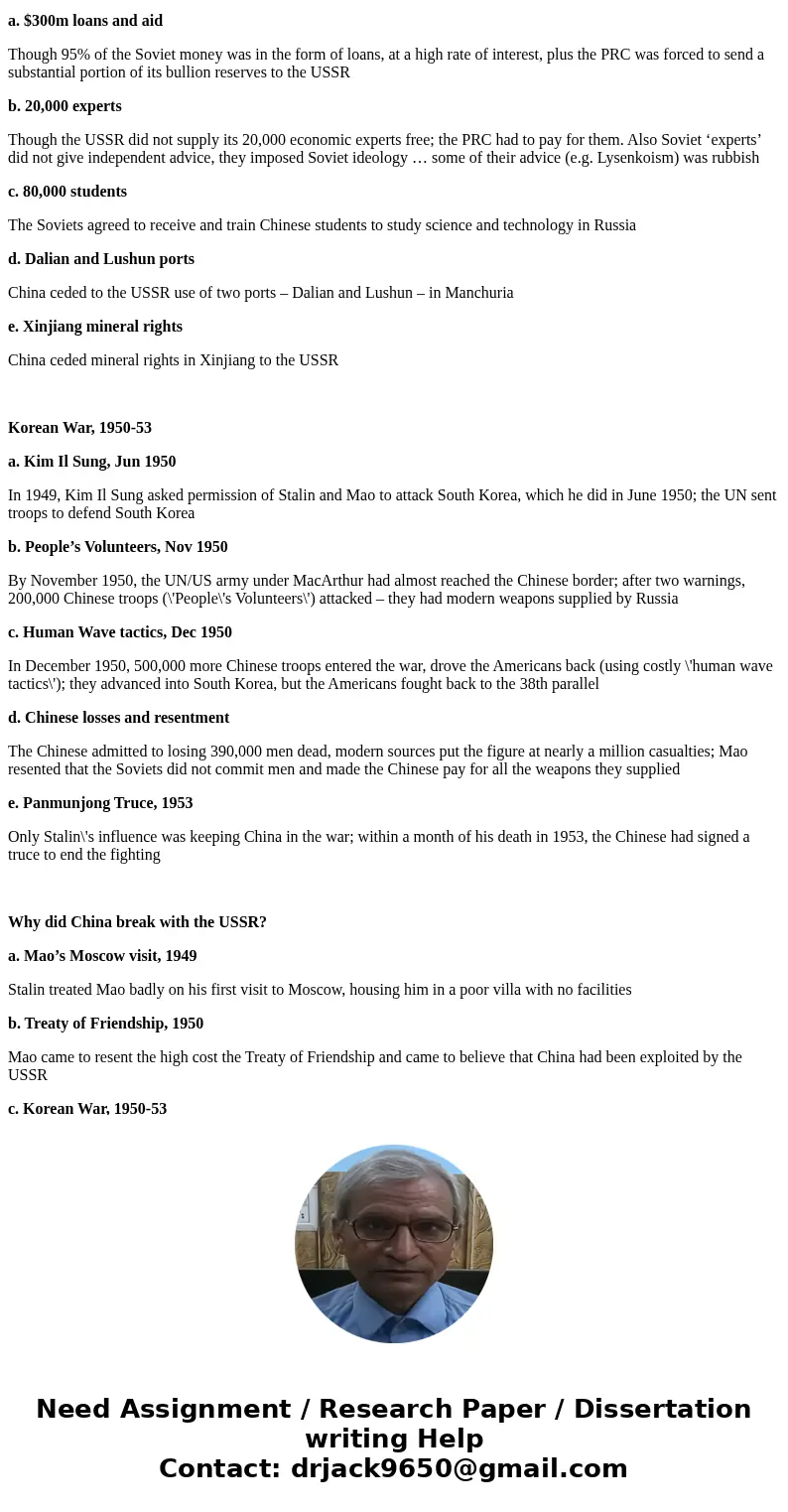
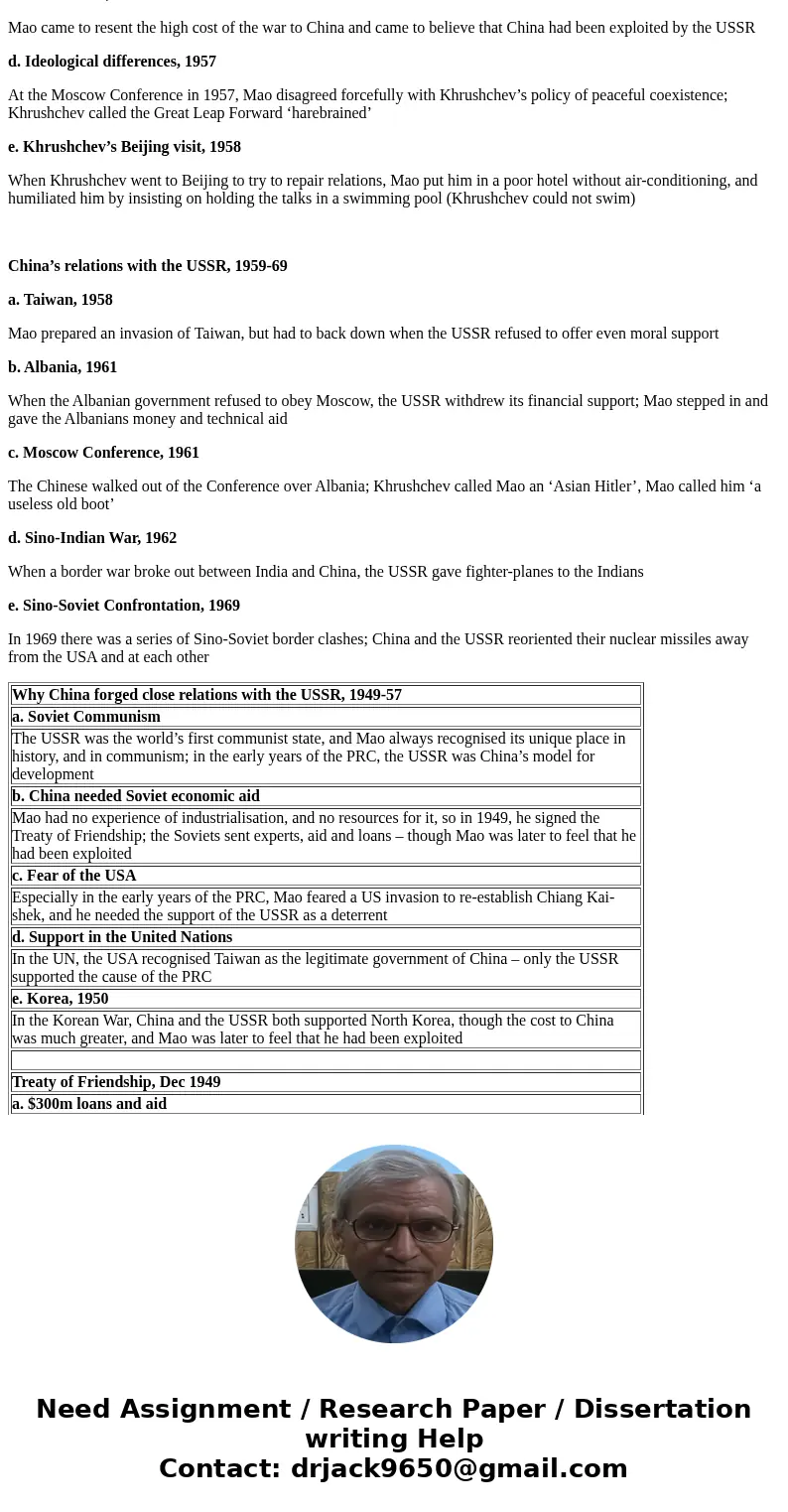
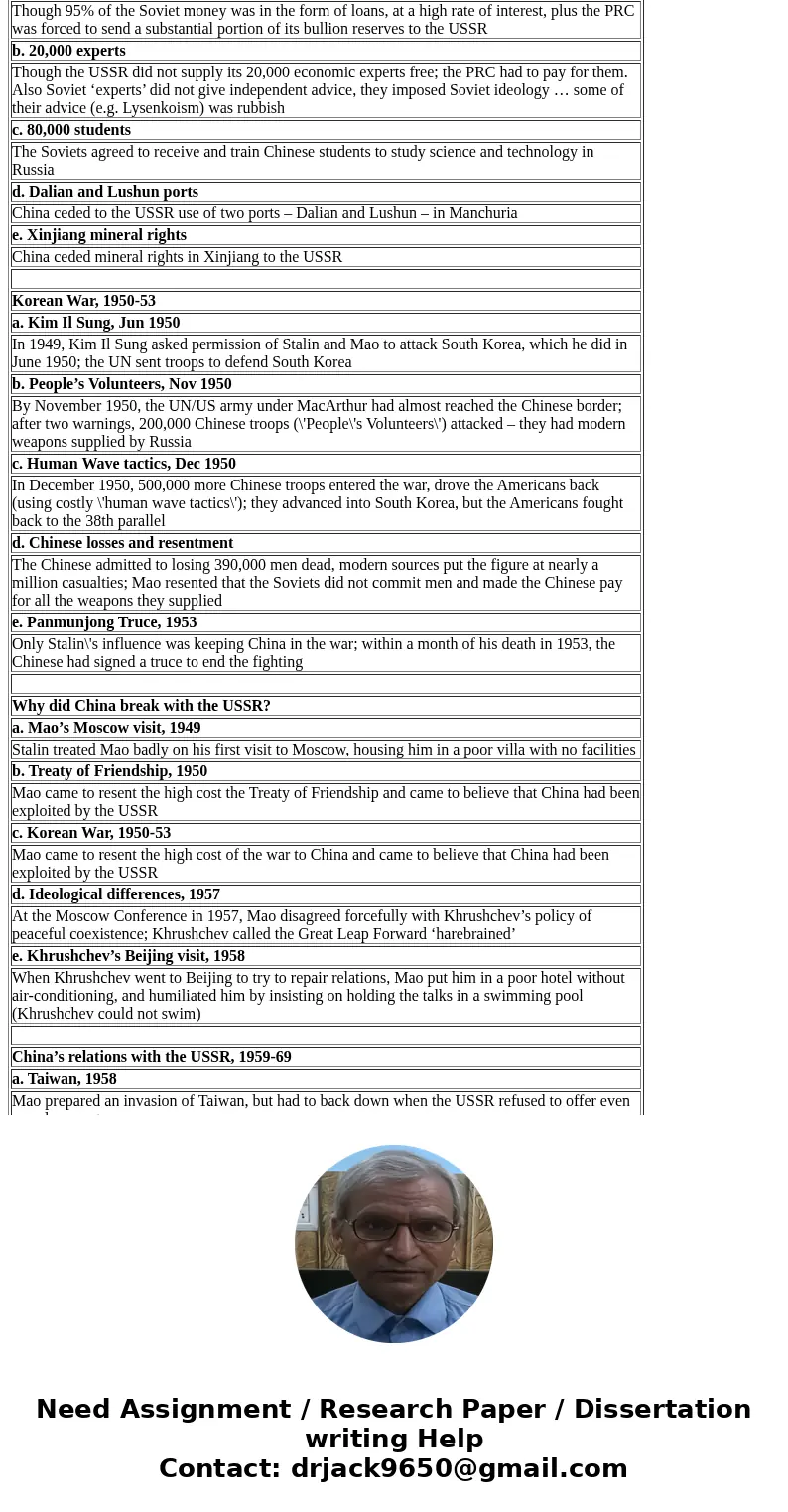
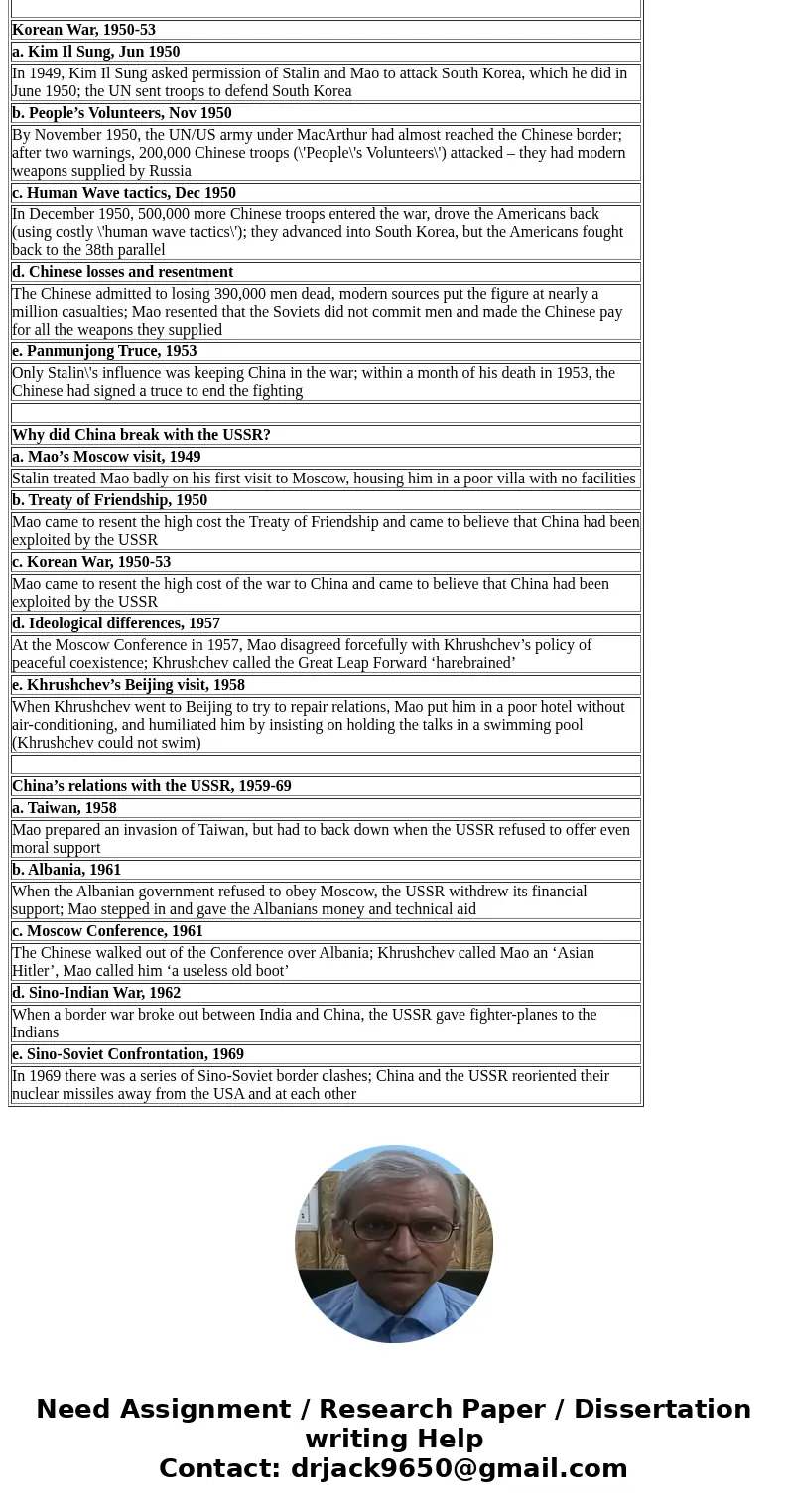
 Homework Sourse
Homework Sourse